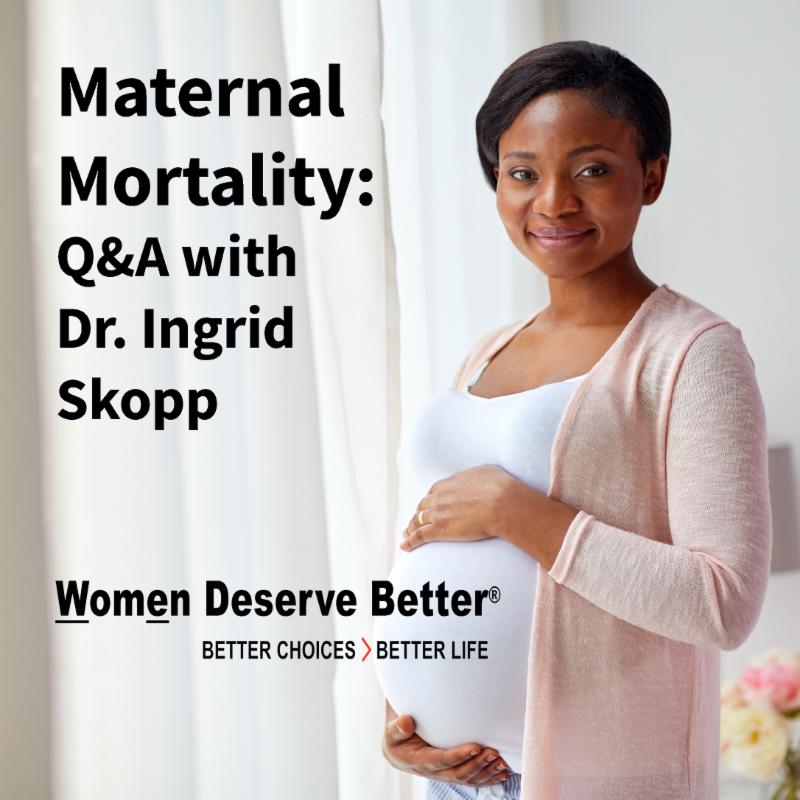Reducing Maternal Mortality: An OB-GYN’s Perspective
Women considering pregnancy or who are already pregnant are likely concerned about recent news reports that the U.S. is experiencing a drastic increase in maternal mortality.
The New York Times recently published an op-ed from a late-term abortion provider, who wrote “Pregnancy Kills. Abortion Saves Lives.” The piece appeared to recommend that women at high risk should terminate their pregnancies in order to protect their health.
So I asked OB-GYN and Women Deserve Better Contributor Dr. Ingrid Skop for insights as an expert on high-risk pregnancies:

Q. How risky is it for women to die during pregnancy or after giving birth? Can women can feel more in control of their pregnancy and make it safer both before and after birth?
A. As an obstetrician of 28 years, I would like to reassure pregnant women who are concerned about maternal mortality.
The CDC reports that the risk of a mother dying during pregnancy or within a year of the end of pregnancy is 18/100,000 live births. While even one death is too many during this wonderful time of life, it should be put into perspective. The likelihood of dying from an auto accident in a given year is 10/100,000. We do not fear driving a car; neither should we fear giving birth to a child.
Q. What can impact the health of a pregnant woman?
A. There are some preconceptual factors that can impact the health of a woman during pregnancy. We more frequently see older women achieving pregnancy, sometimes with fertility assistance.
In addition, as the rate of obesity has increased in our country, we see other associated medical problems such as hypertension and diabetes. These conditions are all associated with more complicated pregnancies and higher risk of C-section delivery. None of these are reasons not to have a baby. Children are wonderful!
Q. Are there advances in medicine to help improve the health of the mother and baby (or babies in the case of multiple births)?
A. An entire obstetrics subspecialty called maternal-fetal medicine has arisen to ensure that a mother and her child will make it safely through pregnancy. Your obstetrician may be very comfortable managing your care since these conditions are increasingly common, but if you are worried, you can request a referral to a high-risk specialist who can assist your obstetrician in your care.
Q. What makes a pregnancy high risk?
A. There are some conditions diagnosed during a pregnancy that may place a mother at higher risk. One such situation is abnormal placentation — a placenta located over the cervix, or invasive into the wall of the uterus — that can increase the risk of blood loss during delivery. This is usually diagnosed by ultrasound, and your OB will talk with you about precautions to avoid bleeding. Some hospitals are better equipped than others to handle emergency situations that may arise during delivery, so your OB should be able to reassure you about this. Many hospitals have begun implementing drills of possible emergencies, such as hemorrhage or hypertensive crisis, to make sure the staff are prepared to handle any situation that should arise.
Q. What factors have made maternal mortality rates rise?
A. Sadly, an increasingly common reason for a woman’s death related to pregnancy is mental health issues.
Suicides related to postpartum depression, opioid overdoses, and even domestic homicide are seen far more often than in previous years. These correlate with decreasing support for a pregnant woman, as many men do not choose to remain involved in the lives of their children or may be abusive to the mother of their child. This is a tragic situation, but no matter where you live, there is help available.
Q. Where should women turn for help?
A. Pregnancy resource centers exist in nearly every community and can assist a pregnant woman with resources. Mental health counseling, domestic violence intervention, and substance abuse treatment programs are proliferating to meet these needs. If you struggle with any of these concerns, be sure to talk with your doctor, who can help you find the resources you need.
Q. What final thoughts do you have for women who are hoping to conceive or are pregnant now?
A. Take heart. The path you are on may seem hard at times, but becoming a mother is one of the most important things you can do in life. You will be rewarded many times over for the difficulties you will overcome to bring a new human life into the world. Women are strong. Our bodies are exquisitely designed for the complex process of creating and nurturing human life. Don’t let anyone convince you that you cannot do this!
Thank you, Dr. Skop, for sharing your expertise.
We invite women — and all who support them — to go to WomenDeserveBetter.com for more information to help women Work, Learn, Live, and Love better.
Because women deserve better,
Serrin M. Foster
President
Feminists for Life of America





